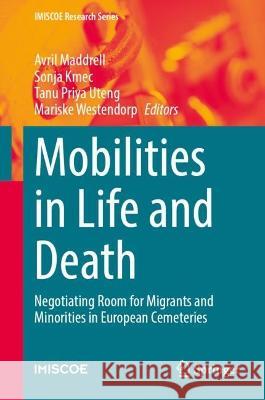Mobilities in Life and Death: Negotiating Room for Migrants and Minorities in European Cemeteries » książka
Mobilities in Life and Death: Negotiating Room for Migrants and Minorities in European Cemeteries
ISBN-13: 9783031282836 / Angielski
Mobilities in Life and Death: Negotiating Room for Migrants and Minorities in European Cemeteries
ISBN-13: 9783031282836 / Angielski
(netto: 191,66 VAT: 5%)
Najniższa cena z 30 dni: 192,74
ok. 22 dni roboczych
Bez gwarancji dostawy przed świętami
Darmowa dostawa!
This open access book focuses on migrant and minority cemetery needs through the conceptual lens of the mobilities of the living and the dead. In doing so, the book brings migration and mobility studies into much-needed dialogue with death studies to explore the symbolically and politically important issue of culturally inclusive spaces of cemeteries and crematoria for migrants and established minorities. The book addresses majority and minority cemetery and crematoria provisions and practices in a range of North West European contexts. It describes how the planning, management and use of cemeteries and crematoria in multicultural societies can tell us about the everyday lived experiences of migration and migrant heritage, urban diversity, social inclusion and exclusion in Europe, and how these relate to migrant and minority experience of lived citizenship, practices of territoriality and bordering, colonial/postcolonial narratives.The book will be of interest to readers in the fields of migration/mobilities studies and death studies, as well as policy makers and practitioners, such as local government officers, cemetery managers and city planners.
This open access book focuses on migrant and minority cemetery needs through the conceptual lens of the mobilities of the living and the dead. In doing so, the book brings migration and mobility studies into much-needed dialogue with death studies to explore the symbolically and politically important issue of culturally inclusive spaces of cemeteries and crematoria for migrants and established minorities. The book addresses majority and minority cemetery and crematoria provisions and practices in a range of North West European contexts. It describes how the planning, management and use of cemeteries and crematoria in multicultural societies can tell us about the everyday lived experiences of migration and migrant heritage, urban diversity, social inclusion and exclusion in Europe, and how these relate to migrant and minority experience of lived citizenship, practices of territoriality and bordering, colonial/postcolonial narratives.The book will be of interest to readers in the fields of migration/mobilities studies and death studies, as well as policy makers and practitioners, such as local government officers, cemetery managers and city planners.











